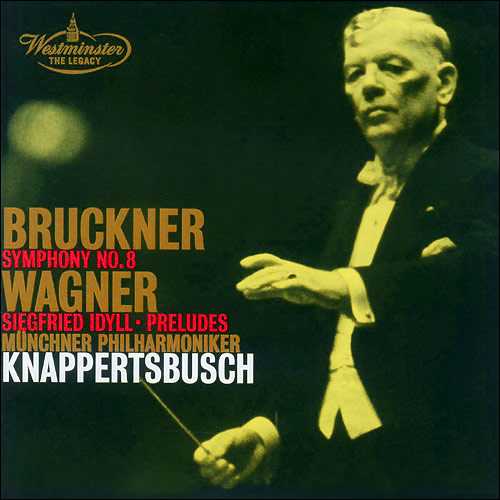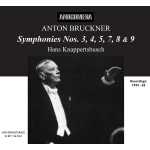
Number of Discs: 2
Format: WavPack (image+cue)
Label: Deutsche Grammophon
Size: 617 MB
Recovery: +3%
Scan: yes
# Symphony No. 8 in C minor (“Apocalyptic”; “The German Michel”), WAB 108 (various versions)
Composed by Anton Bruckner
Performed by Munich Philharmonic Orchestra
Conducted by Hans Knappertsbusch
# Lohengrin, opera, WWV 75 Prelude to Act 1
Composed by Richard Wagner
Performed by Munich Philharmonic Orchestra
Conducted by Hans Knappertsbusch
# Siegfried Idyll, for small orchestra in E major, WWV 103
Composed by Richard Wagner
Performed by Munich Philharmonic Orchestra
Conducted by Hans Knappertsbusch
# Parsifal, opera, WWV 111 Prelude to Act 1
Composed by Richard Wagner
Performed by Munich Philharmonic Orchestra
Conducted by Hans Knappertsbusch
knappertsbusch_bruckner_symphony8_wagner_siegfried_idyll_preludes02.rar – 327.2 MB
Eloquent, Rich, Rewarding
This is an unhurried, broad, flowing acccount of the Bruckner Eighth. Where Eugen Jochum gives the impression of an imbedded, coiled spring or trigger, ready to be released in certain places, Knappertsbusch seems more secure in relying on an elastic-like, breathing in and out motion. While slower in tempo than others, he does not lead a dull, plodding performance. Instead, he re-creates an emotionally and spiritually satisfying experience. Bruckner’s peaks do not emerge with stark cragginess, but rather with rounded stateliness. Melodies are permitted to unfold in an easy, natural fashion. Textures radiate with a glowing warmth that many others simply do not convey. Additionally, though it would be unlikely for anyone to claim that the Munich Philharmonic is or was in the same class as the Amsterdam Concertgebouw or Berlin Philharmonic, I must say that it performs so marvelously that one might consider its accomplishment here to be as worthy as that of any of the world’s greatest orchestras. I can’t guarantee that you will wind up appreciating this performance, but its discovery for me has been a bit of a revelation. I also wish to add that Knappertsbusch brings the same, special, glowing qualities to his Wagner performances. Siegfried Idyll is lovely, and the pieces from Lohengrin and Parsifal sound as if they were lifted from an aura of medieval mists.
Knappertsbusch and the Jungians
Several very intelligent reviews of this performance give a great deal of attention to the conductors speed – or slowness – but none confront the utter absence of any consistent identifying constructs. This seems rather important – far more than the endless carping about editions.
What I hear in this performance is Knappertsbusch, giving all his energy and attention over to the moment – so much so that any overarching structure to the entire enterprize quite dissolves in his attempt to plumb the music’s forbidding depths, a symphonic exploration of the darkest and deepest and even beyond – diving down into the unlit, a veritable and dangerous free dive to the furthertmost crushing reaches of the floor of the Mariana Trench. Instead of a precisely delineated sense of dramatic narrative – think, say, a symphony No. 7 by Dvorak or a 4th by Brahms – in this late 19th century masterpiece as led by Knappertsbusch unsettled and unsettling forms rise out nothingness and then fall back into an annihilating darkness. This constant recreation breaks and bends back on itself into unfathomable depths – with each new upswelling and disappearance replaced with new variations of every possible weight and gravity – all this taking place in a totally bewildering fashion – growing explosions of form suddenly interrupted with momentary diapause, then re-emerging. All this continues until an epic connection with gigantic shapes and monstrously large notations dominates. There is something of Schonberg’s overwrought Pelleas et Melisande too all this – myth recreated internally and projected outward.
Try as I might, there is little rational about this music, at least for me as Knappertsbusch here leads it. It clearly represents a highly tortured and Dantesque journey of the self through a cataclysmic universe, but precisely where we are headed and why remains unknowable.
We’re all aware of the boatloads of books addressing Richard Wagner’s music from every conceivable psychological approach. How odd that similar efforts have not appeared – to any great extent – for Bruckner. Much of this can be traced to Bruckner’s ouerve – these are not works directly tied to literature – always a boon to the non-musical. Absent such clues, there’s so much less to extrapolate in Bruckner.
However, the lack of written documents in no way should prohibit such research into the essence of this artist. Knappertsbusch certainly is unafraid in this recording to give himself entirely over to the moment, and I tip my hat to Bernard for linking Bruckner with the epic of Sumerian King Gilgamesh. Exactly how we proceed in studying Bruckner I think the time is long overdue for letting go of the decades of sniping pedantry focused on the various editions, and move forward into the far richer in rewards, if more demanding and problematical, world of myths and self at the heart of this music.
PS – Realizing the Pandora’s Box involved, I hesitate suggesting poor Bruckner be turned over to musical De-constructionists, or that future Bruckner reviews must be written in French, filled with made up academic words.




Many thanks for this one Whatever. These performance are fascinating with the Lohengrin prelude being truly luminous.
Yes, thanks for this.
Thanks
Thank you
Whatever, man… how many Bruckner discs do you actually own???? :shock:
Thank you so much guys for all this Bruckner! The amount and choice are simply overwhelming!!